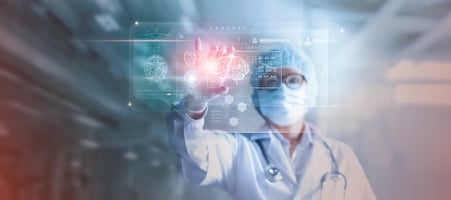From data to decisions: How AI-driven healthcare organizations are scaling like never before

Cancer affects millions worldwide, and in the U.S. alone, breast cancer impacts over 250,000 women each year, costing around $20 billion. While mammograms are essential for early detection, limited radiologist availability can slow down diagnoses. That’s where AI is making a real difference—AI-powered risk assessment models are helping doctors catch potential issues earlier, ensuring patients get the right treatment sooner and improving outcomes at the same time
On similar lines, chemotherapy treatment has often involved trial and error, but AI is making it smarter. By analysing patient data, genetics, and treatment outcomes, AI helps doctors choose the best medications for each patient, leading to better results with fewer side effects
AI is scaling up healthcare by rapidly analysing data, assisting in diagnostics, and optimizing hospital operations. From predictive analytics to robotic process automation, healthcare organizations are scaling their capabilities in ways that were unimaginable just a decade ago.
This shift is improving patient outcomes and helping healthcare providers scale their operations more efficiently than ever.
Highlight: By tapping into AI, healthcare organizations are working smarter—boosting efficiency, cutting costs, and delivering better patient outcomes.
From optimizing revenue cycle management (RCM) to improving patient care and simplifying compliance, AI is helping healthcare organizations scale like never before. By tapping into AI, these organizations are working smarter—boosting efficiency, cutting costs, and delivering better patient outcomes. But what does that kind of AI-driven growth actually look like in practice?
Optimizing financial and regulatory performance
Healthcare CFOs face challenges like rising costs, complex regulations, and the shift to value-based care. CFOs and compliance leaders in healthcare are always balancing budgets while keeping up with strict regulations. AI-powered financial analytics help CFOs spot billing inefficiencies, detect fraud, and predict revenue trends, while compliance officers use AI to automate reporting and streamline audits. This means organizations can scale without adding to their administrative workload.
AI and cybersecurity, it’s a bond to last!
As per the ‘2024 Healthcare Data Breach Report’, “Large healthcare data breaches continue to be reported to the Department of Health and Human Services (HHS) Office for Civil Rights (OCR) in high numbers. As of January 28, 2025, the OCR data breach portal shows 725 data breaches of 500 or more records in 2024, the third consecutive year that more than 700 large data breaches have been reported to OCR.” It further shares some alarming numbers, “While the number of reported data breaches is leveling off, the number of records exposed, stolen, or impermissibly disclosed has increased at an alarming rate since 2022. In 2021, 60 million healthcare records were breached, and 57 million in 2022, but the following year saw a 192% increase to 168 million breached records, followed by a 63.5% increase to 275 million records in 2024.”
AI helps enhance healthcare cybersecurity by automating threat detection, strengthening network security, and improving incident response. It continuously monitors network activity, detects vulnerabilities across devices, and isolates threats in real time to minimize damage. Additionally, AI-driven predictive analytics anticipate potential risks, while adaptive encryption safeguards sensitive patient and financial data against evolving cyber threats.
Driving data-driven healthcare innovation
AI is rapidly transforming healthcare, and Chief Data Officers (CDOs) and Chief AI Officers (CAIOs) are leading the charge. Technologies like predictive analytics, natural language processing (NLP), and AI-powered imaging are making diagnostics faster and more precise. AI-driven automation is also streamlining clinical documentation, helping reduce physician burnout.
As AI becomes more essential in healthcare, the roles of CDOs and CAIOs are evolving. They shape AI strategies, oversee investments, ensure compliance, and drive innovation. Dennis Chornenky, Chief AI Adviser at UC Davis Health, emphasizes that a CAIO's main role is to accelerate AI adoption while balancing safety and progress.
AI future for your healthcare organization is just a ‘pulse’ away!
AI is helping healthcare organizations scale like never before—boosting efficiency, improving patient outcomes, and keeping compliance in check. By giving CFOs, CISOs, medical directors, RCM leaders, and AI/ML executives the power of intelligent automation, these organizations are setting new industry benchmarks. And as AI keeps advancing, healthcare will only become more scalable, making high-quality, data-driven care more accessible.
Ready to take your healthcare organization to the next level with AI? Connect with our team of experts to see how AI-powered solutions can transform your operations.


